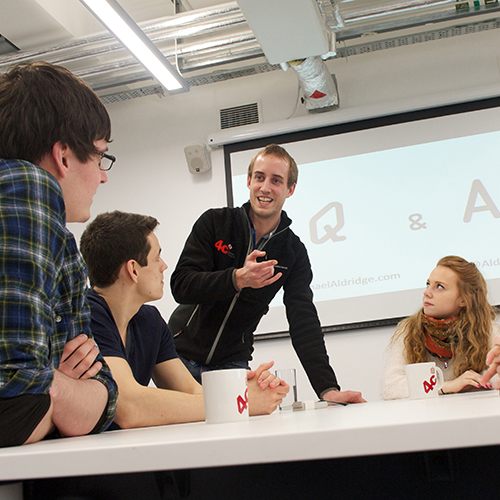-min.jpg)
Design, Manufacturing & Engineering ManagementInterested in Participating in DMEM's Individual and Industrial Group Projects?
What is the scheme?
The Design, Manufacturing & Engineering Management (DMEM) Industrial Projects scheme enables companies to engage with the Department by setting project briefs for students and student teams.
Over the years we have helped a large number of companies, from start-ups to multinational and public organisations, to explore new ideas, concepts and systems. Collaboration as part of the scheme can help registered companies who lack the necessary time or resource to turn ideas into reality.
Why should you get involved?
Participating companies have experienced a number of benefits:
- access to University equipment, resources, cutting edge technologies and techniques
- leadership and management training opportunities for young staff
- opportunities to experience the latest design methodologies with a view to improving company design processes
- access to enthusiastic senior undergraduate and postgraduate students.
How does it work?
Development teams consist of senior undergraduate and postgraduate students from product design, manufacture and engineering management related degree programmes. Our students have expertise in product design engineering, product design innovation, sports design engineering, manufacturing and engineering management. Projects usually fall within one or more of these areas.
A company representative is appointed to liaise with the team. Teams are allocated a DMEM academic mentor who provides support and guidance throughout the project to ensure the project deliverables are met. The mentors may include both University staff and Royal Academy of Engineering visiting professors.
Students meet at least once per week in the DMEM studio space to discuss progress with academic staff.
When do projects run?
Depending on the topic of the project and degree of challenge, the project will be assigned to a class by the DMEM project team. The majority of projects will be assigned to the Industrial Group Projects (IGP) class as this has the highest capacity.
Each class has a different focus for the type of project:
The Undergraduate/Postgraduate Industry Group Projects (IGP)
This class challenges a group of students to tackle a design, manufacturing, mechatronics and automation, or the management of an industry problem.
It runs from October to May and January to August each year. If involved in this class, it is expected that the industrial client will attend the Industrial projects presentation day in May or August.
The Postgraduate Individual Projects
This class involves an individual student on a range of challenges including design, manufacturing, Mechatronics and automation, supply chain or engineering management. It runs from January to August and March to September each year.

Project format(s)
Once a brief has been finalised between the client company through preliminary discussions, the project is allocated to a suitable team of either single-discipline or multi-discipline students. Projects are related to the areas of product design and development, manufacturing and engineering management.
Examples
Examples include the design and prototyping of a countertop dispenser for a soap manufacturer, process improvement at a bottling plant using simulation analysis, and the development of a CSR strategy for a high-end audio company.
Appoint representatives
Projects are best realised through commitment and active involvement. The client company, University and student team each appoint representatives who are readily available to communicate and liaise on a regular, informal basis.
Stages
There are four stages to each project with associated milestones. At each milestone, formal feedback is required of the client company. This engages both the student teams and clients in presentations or meetings to reach shared decisions.
Brief
Once a project has been agreed a development team and University mentor are appointed. The client, mentor and team then meet for formal discussions to ensure all parties are clear on the content of the project brief.
Definition
A thorough investigation is carried out to define the parameters and criteria to take the project forward. This may be presented as a design specification, layout schematic, gap analysis, or other appropriate format.
Conceptualisation
The team typically develops a range of concepts and solutions to the particular problem, identifying avenues for development as the project progresses. For example, rendered CAD models may be generated, evaluated and presented to the client. A key outcome of this stage is clarity on final project deliverables. Teams have access to DMEM’s state-of-the-art Digital Design and Manufacturing Studio (DDMS), including virtual and rapid prototyping.
Realisation
The final project solution typically includes a report which should be of strategic benefit to the client organisation, accompanied by supporting models or drawings as appropriate.
The final project report may be accompanied by a prototype, CAD layouts, experimental data or other identified deliverables.
Companies we've worked with
- 3M
- Chesapeake Corporation
- Chivas Brothers
- Claymore Surgical Ltd.
- Clyde Space
- Diageo
- Emergency One
- Fearsome Engine
- Hoover
- Hovis
- Howden Compressors
- Invitrogen
- Jaguar Land Rover
- Macphie
- MathWorks
- Metacarpal
- NHS
- Philips
- Polaroid Eyewear
- Rolls-Royce
- Scott Sports
- Scottish Leather Group
- Scottoiler
- Strathclyde Police
- The National Centre for Prosthetics and Orthotics
- Unilever
- United Central Bakeries
We find the DMEM projects provide a different and refreshing perspective... last year’s project was particularly successful and is being prototyped for possible production. We have also had a number of graduates working with our team, all of whom have gone on to full-time employment.
Dr David Sykes Separations Project Leader, Hoover
Deb found this a highly rewarding scheme, not only in terms of design output but also in the working relationship formed with the students and University. As such, it has been a valuable developmental experience for many of our staff.
Dean Limbert R&D Manager - Design, Deb Group
Sustainable Development Goals
We support the 17 United Nations Sustainable Development Goals.